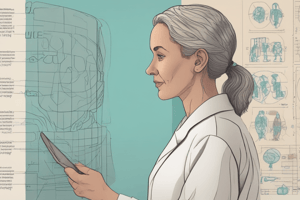Podcast
Questions and Answers
Evidence-based decision making is a new term for an old concept. Is this true?
Evidence-based decision making is a new term for an old concept. Is this true?
False (B)
What are the two fundamental principles of evidence-based decision making? Select all that apply
What are the two fundamental principles of evidence-based decision making? Select all that apply
- Traditional decision-making relies on intuition, unsystematic clinical experience, and pathophysiologic rationale
- A hierarchy of evidence exists to guide clinical decision-making (correct)
- A hierarchy of evidence does not exist to guide treatment decisions
- Evidence alone can be sufficient to make clinical decisions
- Evidence alone is never sufficient to make a clinical decision (correct)
The need for Evidence-based Decision Making (EBDM) has been brought about by variations in dental practice, slow translation and assimilation of scientific evidence, information overload and changing educational competencies. Is this true?
The need for Evidence-based Decision Making (EBDM) has been brought about by variations in dental practice, slow translation and assimilation of scientific evidence, information overload and changing educational competencies. Is this true?
True (A)
Match the following levels of evidence with their respective types of study:
Match the following levels of evidence with their respective types of study:
Which of the following is the most appropriate type of study for questions related to therapy and prevention?
Which of the following is the most appropriate type of study for questions related to therapy and prevention?
What is the first step in the Evidence-Based Decision Making (EBDM) process?
What is the first step in the Evidence-Based Decision Making (EBDM) process?
The Comparison component of the PICO question is always essential.
The Comparison component of the PICO question is always essential.
The Outcome component of the PICO question should be measurable and directly solve the problem.
The Outcome component of the PICO question should be measurable and directly solve the problem.
Evidence-based decision making is about knowing all the answers.
Evidence-based decision making is about knowing all the answers.
What are the benefits of the EBDM process? (Select all that apply)
What are the benefits of the EBDM process? (Select all that apply)
Flashcards
Create flashcards
Create flashcards
To generate cards with terms, definitions, hints, and memory tips for learning.
10 flashcards
10 flashcards
A set of ten flashcards focusing on key concepts for learning.
Term
Term
A key word or phrase used as the question on a flashcard.
Definition
Definition
Signup and view all the flashcards
Hint
Hint
Signup and view all the flashcards
Memory Tip
Memory Tip
Signup and view all the flashcards
Key concepts
Key concepts
Signup and view all the flashcards
Simple explanations
Simple explanations
Signup and view all the flashcards
Educational Value
Educational Value
Signup and view all the flashcards
Non-educational content
Non-educational content
Signup and view all the flashcards
Study Notes
Evidence-Based Decision Making: Introduction
- This course aims to increase knowledge of evidence-based concepts, principles, and skills, and how to formulate good clinical questions to find relevant evidence.
- Course authors include Jane L. Forrest, EdD, BSDH, and Lesley McGovern Kupiec, RDH, MSDH.
- The course is 2 hours in duration.
- Intended audience includes dentists, dental hygienists, dental students, and dental hygiene students.
- Course last revised 02/01/2018, with expiration 01/31/2021.
- Course offered online at dentalcare.com
- Participants should be aware of risks associated with applying new techniques or procedures without sufficient evidence-based knowledge.
Conflict of Interest
- Jane Forrest has done consulting for Procter & Gamble (P&G).
- Lesley Kupiec works part-time as a dental hygiene educator for P&G.
ADA CERP
- Procter & Gamble Company is an ADA CERP Recognized Provider.
- ADA CERP is a service of the American Dental Association that assists dental professionals in identifying quality continuing education providers.
- It does not endorse individual courses or instructors.
Evidence-Based Decision Making (EBDM)
- EBDM is a mechanism to stay current in practice by addressing knowledge gaps.
- It includes understanding new concepts and skills, specifically how to formulate answerable clinical questions.
- It uses evidence from research studies, clinical experience, patient preferences, and clinical circumstances.
- Evidence-Based Medicine (EBM) integrates the best research evidence with clinical expertise and patient values.
Levels of Evidence
- Clinical practice guidelines, systematic reviews with meta-analyses, systematic reviews, randomized controlled trials, and well-designed non-randomized control studies are considered strong evidence.
- The hierarchy of evidence, for treatment questions, is based on causation and bias control.
- Higher levels of evidence are associated with fewer studies but higher relevance.
EBDM Skills and 5-Step Process
- The processes include converting information needs into clinical questions using the PICO process (Population, Intervention, Comparison, and Outcome), conducting a comprehensive computerized literature search, critically appraising the evidence, applying the results in practice, and assessing performance.
- The PICO question is essential in EBDM for focusing on important problems in order to find relevant and valid information.
- The course emphasizes the importance of incorporating online searching skills and understanding research methods.
Course Test Preview
- The course test focuses on key EBDM concepts, definitions, and principles.
- Questions assess understanding of clinical expertise, patient values, research, and application of knowledge in practice.
Studying That Suits You
Use AI to generate personalized quizzes and flashcards to suit your learning preferences.
Related Documents
Description
This quiz explores the fundamentals of evidence-based decision making in the dental field. Participants will learn to formulate clinical questions and identify relevant evidence for practice. The course is designed for dental professionals and students looking to enhance their decision-making skills with a focus on evidence-based principles.




